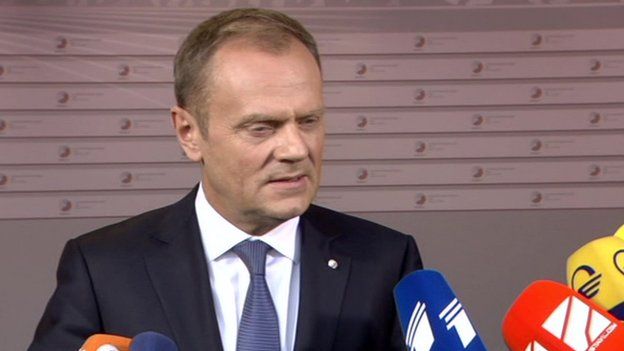EU says Riga summit 'not anti-Russia beauty contest'
- Published

An EU summit with six former Soviet states has opened in Latvia with one leader saying it is not a "beauty contest" to distance them from Russia.
European Council President Donald Tusk accused Russia of "aggressive and bullying tactics" towards its ex-Soviet neighbours. Ukraine and Georgia are among the EU's eastern partners.
But Mr Tusk said the partnership was a "long haul", not aimed against Russia.
It is overshadowed by Russia's role in the conflict in eastern Ukraine.
Mr Tusk said that if Russia was "a bit softer, more charming [...] perhaps it would not have to compensate its shortcomings by destructive aggressive and bullying tactics against its neighbours."
He said that the bloc was determined to support its poorer neighbours despite Russian pressure: "The European Union stays the course despite the intimidation, the aggression, even the war, of the last year," he said.
Russia out of G7
Earlier, German Chancellor Angela Merkel said the EU's Eastern Partnership was not "an instrument for pursuing an expansionist EU policy".
She said that there was a "crystal clear difference with Russia".
"We accept that the different Eastern Partnership nations can go their own way and we accept these different ways," she added.
Mrs Merkel also ruled out letting Russia rejoin the G7 group of major industrialised nations, saying "so long as Russia does not comply with basic common values, a return to the G8 format is not imaginable for us".
The G7 meets in Elmau, southern Germany, next month.
European Commission President Jean-Claude Juncker said Thursday's talks were not about EU membership for the six partnership countries - Armenia, Azerbaijan, Belarus, Georgia, Moldova and Ukraine.
He also said Greece - short of funds to pay back its international creditors - was "not on the agenda".
Ukrainian President Petro Poroshenko meanwhile insisted that he was "not disappointed" with a draft joint statement due to be released on Friday that will reaffirm the "European aspirations" of Ukraine and other countries.
Anastasiya Gribanova visits a camp in Ukraine where the US is helping to train its soldiers
Military training
As the two-day Riga summit got under way, Georgia and Ukraine were conducting military training drills with US troops.
Russia accuses the US and Nato of striving to pull its former Soviet partners into the Western camp, to Russia's detriment.
It is exerting pressure on ex-Soviet states to join a Moscow-led "Eurasian Union".
A far-reaching EU-Ukraine association agreement has angered Russia.
At the summit the EU is expected to approve €1.8bn (£1.3bn; $2bn) for Ukraine - the last instalment of a €3.4bn aid programme.
There is much alarm in Latvia and its Baltic neighbours Estonia and Lithuania over Russia's annexation of Crimea and support for pro-Russian rebels in eastern Ukraine.
The three Baltic states were under Russian domination during decades of communism.
- Published21 May 2015
- Published12 May 2015
- Published20 May 2015